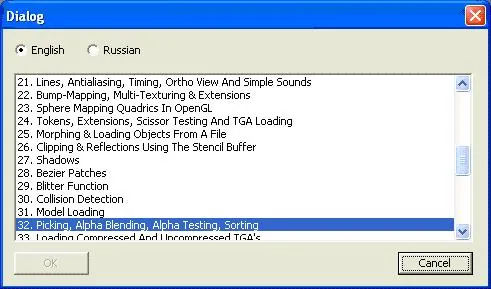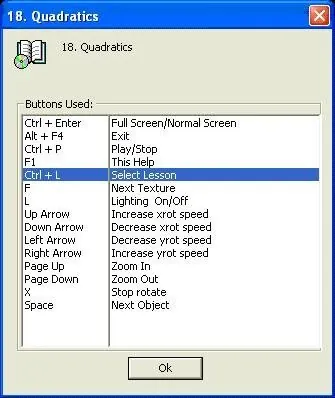Explaining the Concept
Not a long time ago I've found the Russian site of NeHe's OpenGL lessons and thus my study of OpenGL commenced. This is a great idea of people's tutorial on OpenGL. I hope this lesson will help to a lot of users in OpenGL and MFC. While I've adopted the codes of the lessons above one by one to Microsoft Visual Studio the idea of their integration aroused for the compilation of the programs of my own.
Download the source files And already after this job to be completed I've found out the fine adaptation of all the lessons to MS Studio .NET (Grant James) on the NeHe GameDev site, but not adopted to Microsoft Foundation Classes (MFC). As for my point of view MFC have much more possibilities for the application development. I've adopted almost all the codes of the lessons one by one in LessonsGLCode directory and integrated them in one common program GLSummary. While adaptation of the codes I found some conflicts occurred in projects modification from one version of MS Visual Studio to another. Finally in demonstration purpose I've developed the projects as follows (references on me appreciated but not compulsory):
- GLSummaryCode_2010 - concentration of all the lessons in one project;
- LessonsGLCode_2010 - projects of all the lessons (you may call any lesson from another one).
Here 2010 means that projects have been developed for Microsoft Visual Studio Professional 2010. Nevertheless all the projects easily jump into version 2012, but for this version Windows 7 required while version 2010 available in Windows XP SP3 and higher. The Projects above have been developed with the great help of the editor of the Russian site of NeHe Sergey Anisimov whom I thank very much for his kind assistance. The codes above may give a great help for the people who want to study Visual C++ from the beginning. Needless to say that the best way to study any compiler is to start learning with some working projects. Presentation of this lesson refers to GLSummaryCode_2010. However there will not appear too many differences in version 2012. The codes of the lessons adapted to MFC are concentrated in GLSummaryCode_2010 directory. The main project for this lesson is GLSummary. All the initial data for this project and all the others are integrated in Data directory. For codes view and edit GLSummary.sln file to get started. Even if you have no experience in using Visual C++ you may commence to learn it by starting this (or any other enclosed) project. The common procedures for all the projects are located in GlobUse directory. The list of the procedures used in the project to be found by menu
View->Solution Explorer. Just select any *.h or *.cpp file and you may look at and edit it. At the first sight it seemed that there are too many files enclosed but further consideration shows that everything is not too complicated. Compile the program (menu
Build->Build Solution) and start it (menu
Debug->Start Without Debugging). If everything true done the demonstration of the one of the lessons to be commenced (the lesson which name is stored in LastNum.txt file in LessonsGL/GLSummary directory). For any other lesson demonstration select menu File->Lesson... The dialog to be appeared:

You may select any other lesson from the list for demonstration. For the independent application creation:
- create new directory (say, GLTest);
- copy program GLSummary.exe(located in ../GLSummary/Release directory) into this new directory;
- copy Data, Art ? BoxData directories into this new directory and application is ready for use.
GLSummary.cpp, GLSummaryDoc.cpp, GLSummaryView.cppion, GLSummary.rc, resource.h files have been created by Visual C++ compiler while project creation. Mainfrm.cpp file initially also has been created by Visual C++ compiler but later it was moved into GlobUse directory for common use in all the projects. In the GLSummaryView.cpp file and in all the projects in the *View.cpp files procedure
CreateGLWindow to be called by virtual procedure
OnCreate:
int CGLSummaryView::OnCreate(LPCREATESTRUCT lpCreateStruct) { if (CView::OnCreate(lpCreateStruct) == -1) return -1; CreateGLWindow(this,32); return 0; } Initialization procedure
InitGLn to be called by virtual procedure
OnInitialUpdate:
void CGLSummaryView::OnInitialUpdate() { CView::OnInitialUpdate(); FILE * f = fopen("LastNum.txt","rt"); //Get last lesson name if(f != NULL) { fgets(str, 256, f); fclose(f); CString tString = str; m_strNum = strtok(str, ". _-:"); m_strLesson = tString; m_pDlgTitle = new CDlgTitle; m_pDlgTitle->SetTitle(tString); } InitGLn(); GetDocument()->SetTitle(GetLessonName(m_strNum)); } The string variable
m_strNum is global and serves as identification of the lesson selected. Procedure
ResizeGLScene to be called by virtual procedure
OnSize:
void CGLSummaryView::OnSize(UINT nType, int cx, int cy) { CView::OnSize(nType, cx, cy); ReSizeGLScene(cx,cy); GetMainFrameGlob->SetTitlePos(); } The image performance maintains by
DrawGLSceneN to be called by virtual procedure
OnDraw:
void CGLSummaryView::OnDraw(CDC* /*pDC*/) { DrawGLSceneN(); } or by virtual procedure
OnTimer:
void CMainFrame::OnTimer(UINT nIDEvent) { switch(nIDEvent) { case TIMER_PLAY: UpdateGLScene(); DrawGLSceneN(); break; } CFrameWnd::OnTimer(nIDEvent); } or after some actions performed by user. The attributes changes for image performance maintains by
UpdateGLScene procedure to be called by virtual procedure
OnTimer. The procedures
WndProc and
WinMain are not required in MFC. The event handler for Visual C++ in MFC to be used instead
WinMain procedure in original lessons. E.g., handling of 'L' key pressed executed by
CGLSummaryView::OnVkL:
void CGLSummaryView::OnVkL(){ProcessKeyboardN("L");} This procedure has been created by AppStudio (menu
View->Resource View). I will not describe the order of the creation of event handler (see the details in MSDN Library). Full screen view in difference with the original lessons occurred by simultaneous pressing Ctrl+Enter and maintained by
CMainFrame::OnVkReturnCtrl procedure:
void CMainFrame::OnVkReturnCtrl() { m_bFullScreen = ! m_bFullScreen; if (m_bFullScreen) { ModifyStyle(WS_CAPTION, 0); m_wndToolBar.ShowWindow(SW_HIDE); m_wndStatusBar.ShowWindow(SW_HIDE); ShowWindow(SW_SHOWMAXIMIZED); HideMenu(); } else { ModifyStyle(WS_CAPTION, WS_OVERLAPPED | WS_CAPTION | FWS_ADDTOTITLE | WS_THICKFRAME | WS_SYSMENU | WS_MINIMIZEBOX | WS_MAXIMIZEBOX | WS_MAXIMIZE); ShowMenu(); m_wndToolBar.ShowWindow(SW_SHOWNORMAL); m_wndStatusBar.ShowWindow(SW_SHOWNORMAL); ShowWindow(SW_SHOWNORMAL); }//if (m_bFullScreen) } F1 key in difference with the original lessons is used for standard use for help call (menu
Help->GL Help Summary) and maintained by
CMainFrame::OnHelp():
void CMainFrame::OnHelp() { if(m_pAboutDlg == NULL) m_pAboutDlg = new CAboutDlg(); m_pAboutDlg->ShowWindow(SW_SHOWNORMAL); Dialog window
m_pAboutDlg is non-modal thus the program handling may be performed as from this window and/or by the other ways:

One more differences with the original lessons is that all the texture procedures integrated in GlobGLTexture.cpp file in GlobUse directory. Just I've added
LoadGLTextureImage(CString fName) procedure which allow to load in texture any image file with the help of the class
CImage:
int LoadGLTextureImage(CString fName) { if(!isFileExist(fName)) { AfxMessageBox("LoadGLTextureImage\nNo File exist:\n" + fName); return FALSE; } CImage * pImg = new CImage; pImg->Load(fName); CBitmap * pBm = GetImgBitmap(pImg); if(pBm == NULL) return FALSE; BITMAP BMP; pBm->GetBitmap(&BMP); GLuint nt = LoadGLTexture(BMP.bmWidth, BMP.bmHeight,GL_BGR_EXT, BMP.bmBits); delete pBm;delete pImg; pImg = NULL; return nt; } You may copy GlobGLTexture.cpp file and use it for any projects using OpenGL development. The lesson's codes themselves are presented in
Solution Explorer window as *DrawInit.cpp files. These are the codes presented in NeHe's GameDev site (Grant James) and as far as possible I've tried not to change the codes while adaptation to MFC. The only big difference is that I dare to exclude
Glaux.lib library from all the projects. Nevertheless I hope the authors of the original codes will not complain. Sure they could not expect from MS VS developers that
Glaux.lib library to be excluded from 10th version commenced. And if it is still possible to include
Glaux.lib in the MS VS 10th version in the 11th version it is not working. The concentrations of all the procedures in one common directory GlobUse make it possible to use and combine common procedures in separate lessons and also to develop new applications based on original lessons. The samples of application development are presented in projects lessonX4/UFOgame and lessonX5/BoxMan. Lesson X4.UFO Games combined from the lessons 07, 11, 30, 32, 34. Lesson X5.BoxMan demonstrates the possibility of figures and their movements creation in outer text files and the user no need to know programmer details space imagination enough. I think that the idea of OpenGL study with the help of the ready working projects completely fit to the people's tutorial on OpenGL. I have not too mu?h experience OpenGL handling and two of the lessons I've failed to adapt to MFC. I hope that for respected authors of the original codes will not be difficult to improve my codes to fit them completely to their original intentions.





